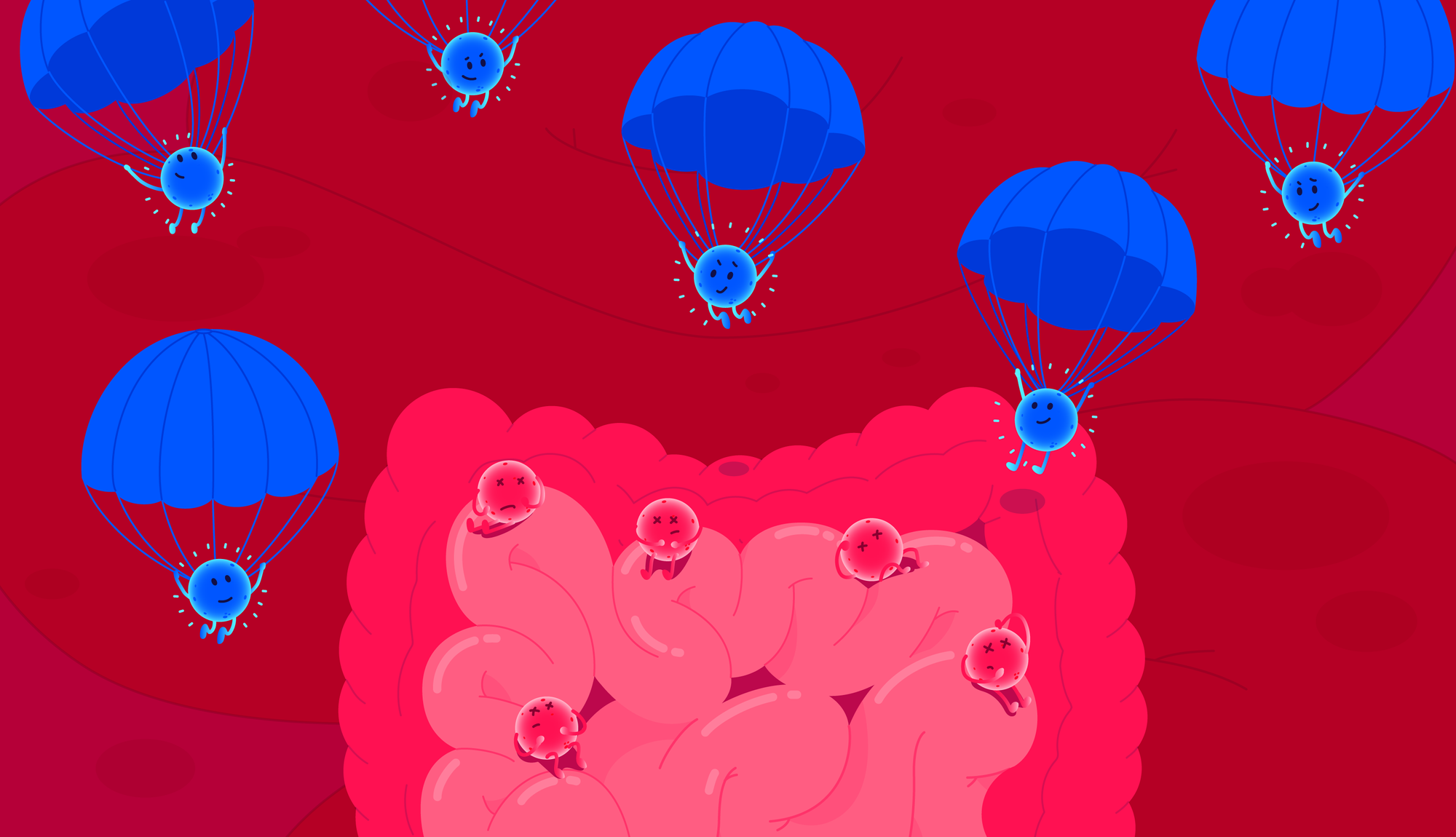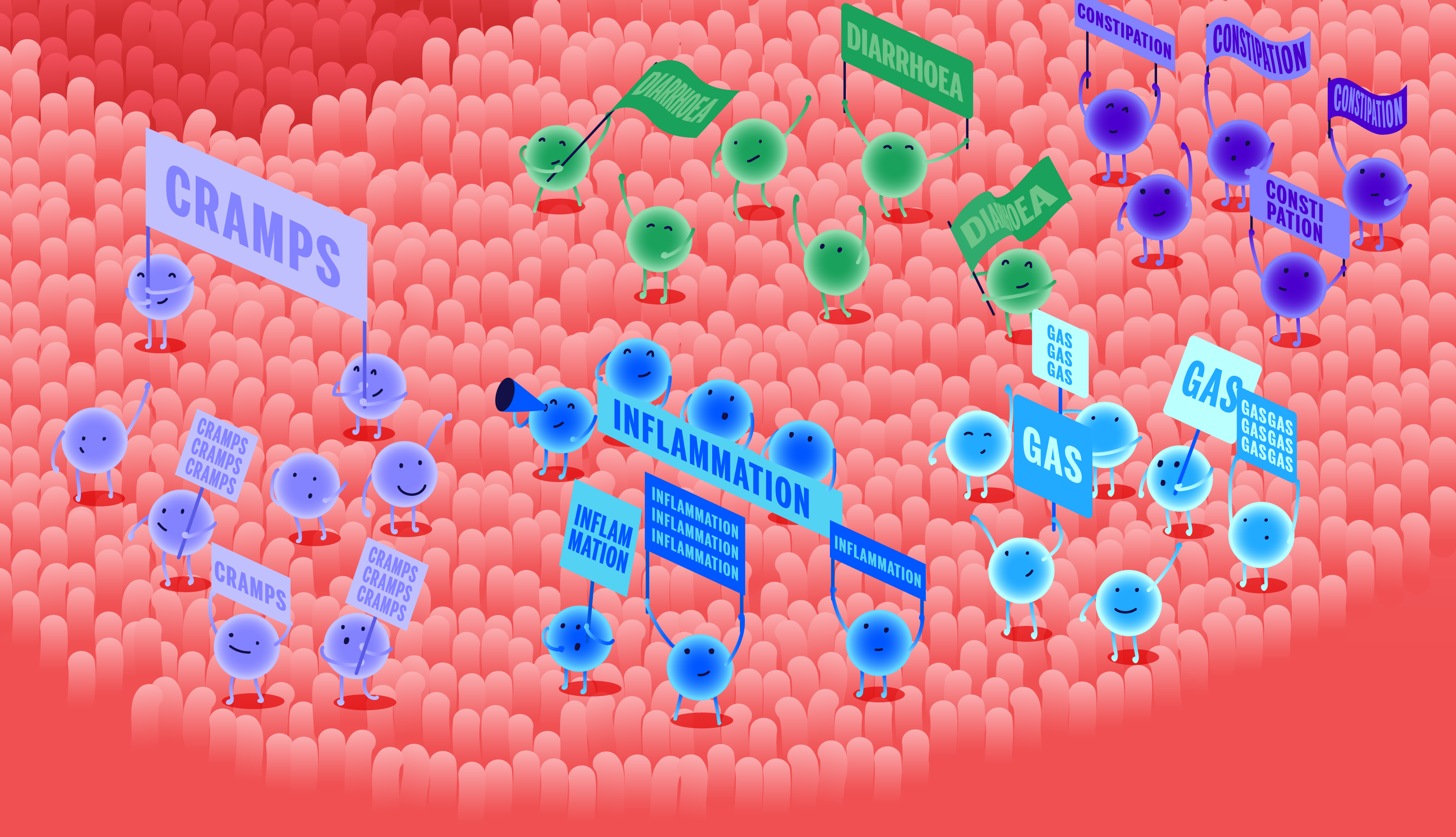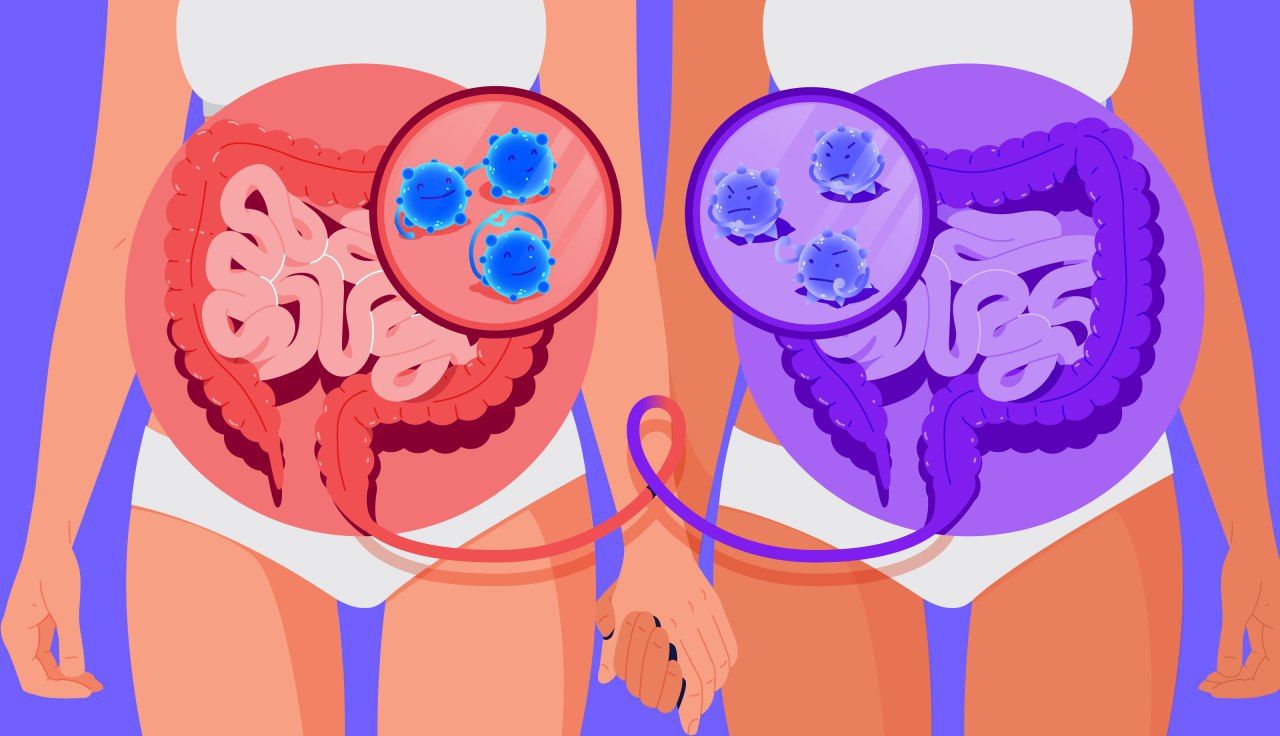Most people will be prescribed antibiotics for a bacterial infection at some point, but they can seriously affect your gut. The good news is that there are things you can do to keep your microbiome flourishing.
Antibiotics treat bacterial infections, but they often cause side effects, especially for your gut and its resident ecosystem of bacteria. Some foods can help to manage the fallout, while others might make them worse. So knowing what foods to eat when taking antibiotics is helpful.
The ecosystem of beneficial and harmless bacterial cells in your colon is called a gut microbiome, and it's essential for your whole body. However, antibiotics do not distinguish between good and bad bacteria, and this can have long-term consequences for the health of your microbiome.
Table of contents
- What’s an antibiotic?
- Antibiotic risks for good gut bacteria and health
- Why should you take probiotics with antibiotics
- Taking probiotics with antibiotics
- When to take antibiotics - before or after food?
- Taking antibiotics with food: combinations to avoid
When a bacterial infection takes hold, antibiotics may be the only line of defence, but they come with side effects like an upset stomach after antibiotics and diarrhoea. They also put women at risk of getting vaginal yeast infections.
However, antibiotics are poorly understood by the general public, so let’s look at the benefits of antibiotics probiotics taken together and how to restore gut flora after antibiotics.
What’s an antibiotic?
Antibiotics are an important tool against bacterial infections. Depending on what class of antibiotic it is, this medication will stop the infection from spreading by one of two ways: killing bacteria, or by preventing them from reproducing.

Antibiotics are usually prescribed to help fight infections caused by pathogenic bacteria. They don’t work against viruses or fungi, which is why they can only be prescribed by doctors and should only be used when absolutely necessary.
Antibiotic risks for your microbiome
That’s because your gut microbiome is critical for your health. It's involved in immune system function, body weight, and even brain health. However, antibiotics can lower the diversity of microbes present in your gut, causing imbalances that increase the risk of inflammation and lower your protection from diseases.
The use of antibiotics during pregnancy, in newborns and infants, is especially problematic because the gut microbiome develops in early life and, during that period, it educates the immune system.
Infants who are exposed to antibiotics either before or after birth have been shown to have fewer health-promoting microbes like Bifidobacteria and Lactobacillus that are dominant members of the infant microbiome.

Research shows that antibiotic disruption of the gut microbiome at a young age is linked with an increased risk of allergies, asthma, and autoimmune disorders. Antibiotics and weight gain are also a major issue: this medication has been pinpointed as an important factor in the obesity epidemic.
For example, Clostridium difficile is a deadly bacterial infection affecting the colon that is common in healthcare settings, and it's resistant to most antibiotics. Nowadays, doctors have found that transplanting a healthy microbiome into patients is most effective when treating for C. diff.
☝️Can antibiotics cause weight gain? Yes, there is plenty of evidence to suggest that antibiotics cause weight gain.
Why should you take probiotics with antibiotics?
Antibiotics are important for treating bacterial infections, but they’re not gut-friendly. Fortunately, you can take steps to preserve and restore your microbiome for whole body health during and after a course of antibiotics.
Research shows that probiotics and antibiotics taken together can reduce the risk of side effects, like diarrhoea. They even help to restore some of the healthy gut microbes lost through antibiotic therapy. Strains of Lactobacillus and Saccharomyces (a beneficial yeast) can help mitigate antibiotic side effects.
☝TIP Find out how your gut microbiome responds to prebiotics and probiotics with the Atlas Microbiome Test.
Taking probiotics with antibiotics
Many people experience nausea, diarrhoea, tummy upsets, bloating, and even vomiting when taking antibiotics. Some doctors recommend taking a probiotic supplement at the same time to help with these digestive side effects.
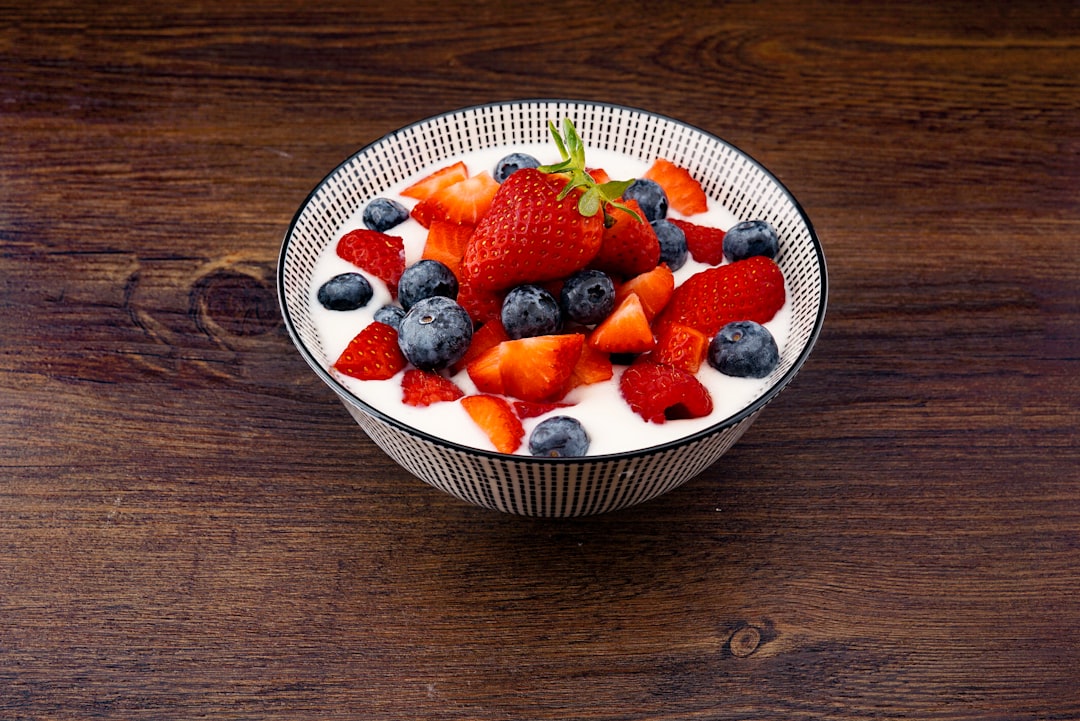
Even after taking antibiotics, you can boost your own beneficial bacteria with probiotic foods and supplements. They contain microbes that maintain your gut environment and help regulate your microbiome, keeping opportunistic pathogens at bay and beneficial ones thriving.
Probiotics for antibiotics
| Probiotic bacteria | Probiotic and fermented foods | Prebiotics |
|---|---|---|
| Bifidobacteria | Yoghurt, milk kefir | Wholegrains, onions, berries, apples |
| Lactic acid bacteria (e.g. lactobacillus and lactococcus) | Yoghurt, Lacto-fermented vegetables, sauerkraut | Soy, barley, apples, chicory root |
All bacteria need to eat. Like other beneficial bacteria, probiotic microbes enjoy plant-based foods rich in prebiotic fibre (a fancy word to describe food in your diet that nourishes your gut microbiota).
Fermented foods are of particular interest to scientists at the moment because they contain known probiotic bacteria as well as prebiotics that keep the probiotic bacteria nourished.
☝Can I take probiotics with antibiotics? Take antibiotics and probiotics a few hours apart so you don’t expose healthy bacteria to this medication.
How to replenish good bacteria after antibiotics
Restoring gut flora after antibiotics is achievable if you eat the correct foods: plants. That's because your gut microbes turn fibers and plant nutrients into important metabolites like short-chain fatty acids (SCFAs) - acetate, butyrate, and propionate - which have important functions:
- fuelling the cells of your gut lining
- preventing damage to your cells (antioxidant)
- anti-cancer properties
- regulating your appetite
- lowering cholesterol
- combating inflammation
- maintaining gut pH
- nourishing other beneficial bacteria
- deterring opportunistic microbes
When to take antibiotics before or after food?
When you are given them, it usually clearly states whether you need to take antibiotics with food. Taking them correctly is key to their effectiveness. You should take them with water because this doesn’t interfere with their effectiveness as some fruit juices do.

Some types will need to be taken with food to reduce the risk of side effects like nausea and vomiting. After all, antibiotics are potent medicines, so it’s not really surprising that they can irritate your digestive system too.
☝️If you’re going to take probiotics with antibiotics, it is best to take them a few hours apart so this medication doesn't affect the probiotic bacteria too.
Taking antibiotics with food
Some foods and drinks can interfere with the effectiveness of antibiotics or make their side effects worse. Knowing what to avoid is essential. For example, grapefruit shouldn’t be eaten with many types of prescription medications, including antibiotics.
What to avoid
- grapefruit and its juice
- calcium-fortified foods
- alcoholic beverages
That’s because grapefruit can interfere with the enzymes responsible for breaking down antibiotics, making them less effective while increasing the probability of side effects. Other studies have shown that foods fortified with calcium may affect the absorption of some antibiotics and make them less effective.
Alcohol is a beverage that you really must avoid when on antibiotics. Depending on the type of antibiotic, there are three potential risks. Some increase the absorption of alcohol, resulting in a stronger state of inebriation.
In other cases, when antibiotics interact with alcohol, they can increase the risk of side effects like nausea, vomiting, and drowsiness. In extreme cases, consuming alcohol and antibiotics can cause liver damage.
☝️Should you take antibiotics with food? Read your prescription, consume with food when indicated and avoid any foods specified.
Probiotics–antibiotics: the bottom line
Antibiotics are important against bacterial infections, but they can cause side effects, including long-term negative changes in the composition of your gut microbiome because they do not distinguish between health-promoting microbes and the ones causing illness.
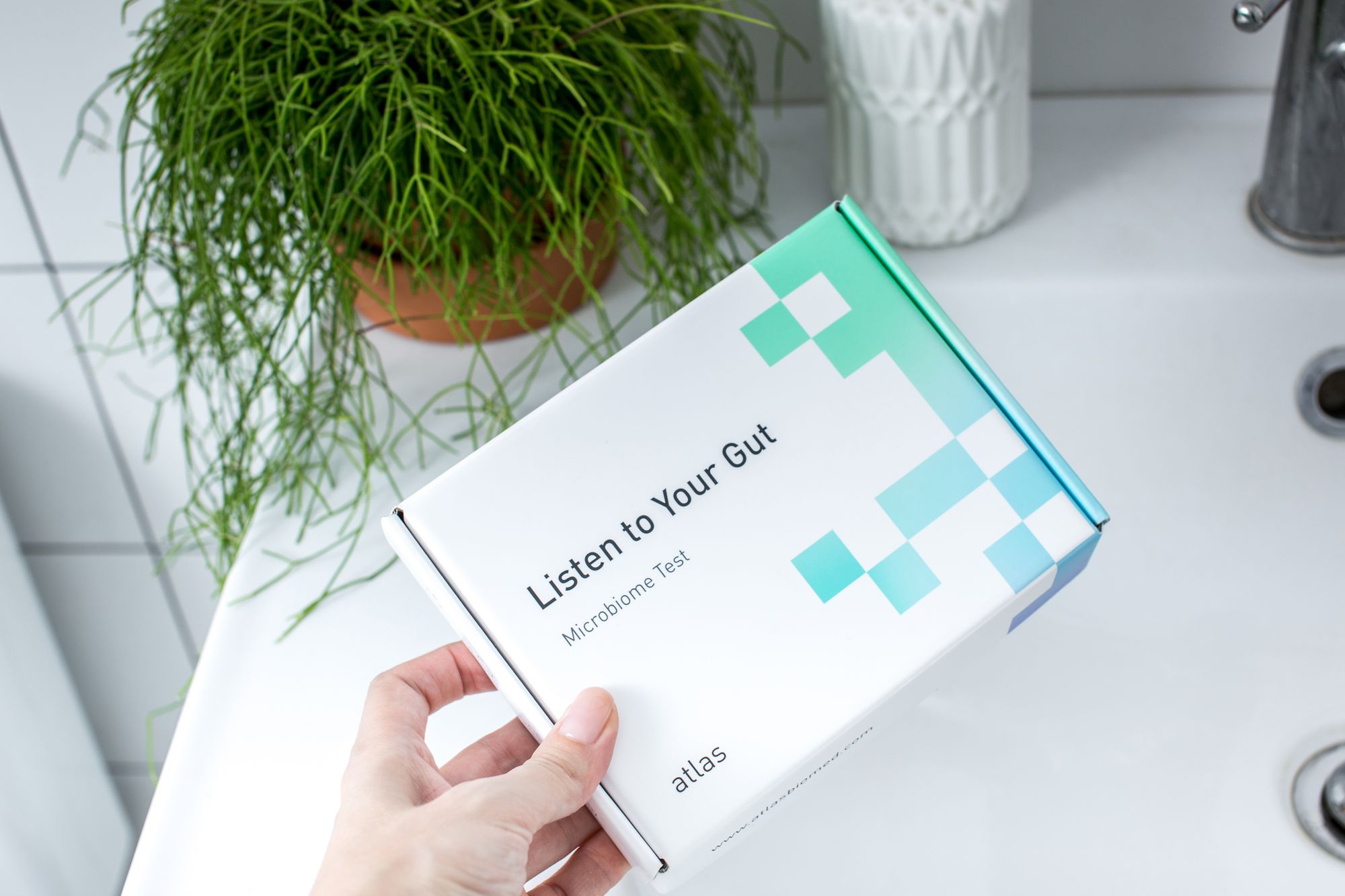
Taking a probiotic supplement or eating probiotic foods may help mitigate immediate side effects, like diarrhoea, and they can help to get your gut microbiome back on track afterwards too.
Incorporating foods that are rich in fibre, as well as fermented foods containing live bacterial cultures, can enrich your microbiome with health-promoting bacteria that help restore this ecosystem to its former glory.
It’s also good to know which foods and beverages to avoid when taking a course of antibiotics. Stay away from alcohol, grapefruit, and calcium-fortified foods to avoid any unnecessary harm from this medication.
You can check in on your gut microbes three months after taking antibiotics with the Atlas Microbiome Test. You'll also receive personalised food recommendations to restore microbiome balance with your diet.
- Akbar, A et al. Lactococcus Lactis subsp. Lactis Isolated From Fermented Milk Products and Its Antimicrobial Potential, 2019
- Bailey, D, G et al. Grapefruit-Medication Interactions: Forbidden Fruit or Avoidable Consequences?, 2013
- Cully, M. Antibiotics Alter the Gut Microbiome and Host Health, 2019
- Czaplewski, L et al. Alternatives to Antibiotics-A Pipeline Portfolio Review, 2016
- Dawson-Hahn, E, E and Rhee, K, E. The Association Between Antibiotics in the First Year of Life and Child Growth Trajectory, 2019
- Del Fiol, F, S et al. Obesity: A New Adverse Effect of Antibiotics, 2018
- Francino, M, P. Antibiotics and The Human Gut Microbiome: Dysbioses and Accumulation of Resistances, 2016
- Jernberg, C et al. Long-term Impacts of Antibiotic Exposure on the Human Intestinal Microbiota, 2010
- Markowiak, P and Slitzewska, K. Effects of Probiotics, Prebiotics and Synbiotics on Human Health, 2017
- Microbiology Society. What Are Antibiotics and How Do They Work?, 2020
- Neuhofel, A, L et al. Lack of Bioequivalence of Ciprofloxacin When Administered with Calcium-Fortified Orange Juice: A New Twist on an Old Interaction, 2002
- Palleja, A et al. Recovery of Gut Microbiota of Healthy Adults Following Antibiotic Exposure, 2018
- Rezac, S et al. Fermented Foods as a Dietary Source of Live Organisms,2018
- Tapiainen, T et al. Impact of Intrapartum and Postnatal Antibiotics on the Gut Microbiome and Emergence of Antimicrobial Resistance in Infants, 2019
- Westhermon, R and Crabb, D, W. Alcohol and Medication Interactions, 1999
- World Health Organization. Antibiotic Resistance, 2018
- Zou, Z et al. Prenatal and Postnatal Antibiotic Exposure Influences the Gut Microbiota of Preterm Infants in Neonatal Intensive Care Units, 2018

